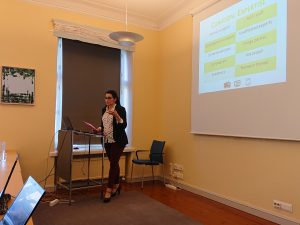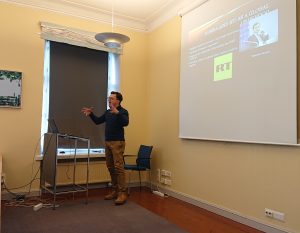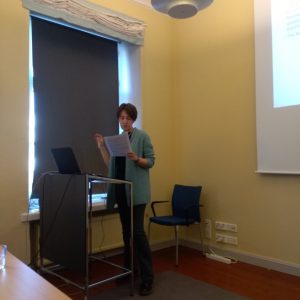On 4 April, STRAPPA organised its first seminar on “Persuasion, conspiracy thinking and the securitisation of information in Russia and beyond” at the Aleksanteri institute. The event brought together a diverse audience of people from various backgrounds – from international relations to computer science – who were interested in the themes of the day. In the opening presentation, Mariëlle Wijermars introduced the rationale behind the STRAPPA project and its aims for the coming three years. The first panel of guest presentations then discussed Russia’s state-funded international broadcaster RT (formerly, Russia Today).

Precious Chatterje-Doody (University of Manchester), a visiting researcher from STRAPPA’s partner project “Reframing Russia for the Global Mediasphere”, presented a paper on “Curation, legitimation and populist communication: the packaging of global politics on RT”. She spoke about the controversy that RT has stirred in several western states, among others in the United Kingdom, and the ongoing policy-level discussions on (whether and) what should be done in about it. Chatterje-Doody also highlighted the flexibility of RT’s self-branding in response to the demands of media environments in different countries and over time.

Ilya Yablokov (University of Leeds) continued the discussion on RT by focusing on the issue of conspiracy theories and its main talking heads on the channel. He showed how, for one of the shows discussed, the first US broadcast was dedicated to 9/11 conspiracy theories and such theories have remained part of RT’s niche ever since. Similar to what Chatterje-Doody argued in her presentation, Yablokov also found that there is a significant variety in the content that is produced for different international audiences.

The second panel started with a paper by Vera Zvereva (University of Jyväskylä) on “Persuasion, mockery, and ambiguity: recent changes in pro-state discourse on Runet”. Zvereva discussed how the language used by Russian senior government officials has gradually converged with the colloquial language used on the streets and online. Whereas in 1999, language experts criticised Vladimir Putin’s tough language regarding measures to counter terrorism, it has by now become apparent that this kind of populist language resonates well with significant parts of the population and is actively used by various government officials, breaking with traditional models of official speech.
The concluding presentation of the seminar, by STRAPPA researcher Teemu Oivo (University of Helsinki/University of Eastern Finland), discussed how Russian TV represented Western journalism in the wake of the downing of Malaysian Airlines passenger jet MH17 over Eastern Ukraine. Oivo focused on how Russian media profiled normative western journalism and its consumers vis-à-vis their Russian peers. He argued that the production of attractive and aversive audience profiles plays a significant role in Russian television, as well as the inclusion of alternative interpretations of contested media events.

One Reply to “Seminar “Persuasion, Conspiracy Thinking and the Securitisation of Information in Russia and Beyond””